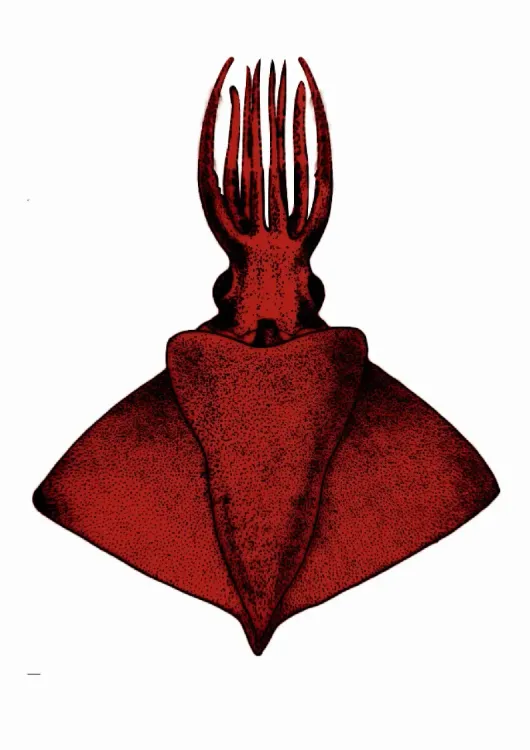What Did Scientists Discover in the Arabian Sea? A Rare Deep Sea 'Octopus Squid'!

Synopsis
Key Takeaways
- The discovery of Taningia silasii adds to the known biodiversity of squids.
- This species is the second confirmed from the genus Taningia.
- It lacks long feeding tentacles, distinguishing it from most squid species.
- The squid's potential size is notable, with relatives reaching 2.3 metres.
- The research honors the contributions of E.G. Silas to marine biology.
Kochi, Nov 21 (NationPress) In a remarkable discovery, researchers from the ICAR -- Central Marine Fisheries Research Institute (CMFRI) based in Kochi have identified a new species of deep-sea squid from the Arabian Sea, marking it as the second confirmed species globally from the obscure genus Taningia.
The newly identified species, referred to as Taningia silasii or the Indian octopus squid, has been officially documented in the international journal Marine Biodiversity.
This specimen was collected from depths approaching 390 metres off the Kollam coastline.
With a dorsal mantle length of 45 cm, this squid is a member of the family Octopoteuthidae, distinguished by the absence of tentacles in adult forms, unlike many squid species.
Despite its classification as a squid, its resemblance to an octopus, characterized by eight arms and the absence of long feeding tentacles, has led to it being termed the 'octopus squid'.
The research team was spearheaded by CMFRI Principal Scientist Geetha Sasikumar and Technical Officer Sajikumar K.K.
'We have been investigating cephalopods in the Arabian Sea for over a decade, yet this 'octopus squid' was entirely unique,' Geetha remarked.
Previously, Taningia danae, native to the Atlantic Ocean, was the only known species in this genus.
DNA barcoding indicated more than 11 percent genetic divergence from the Atlantic species, effectively confirming it as a distinct species.
Sajikumar noted that members of this genus are notable for their potential to attain gigantic sizes, with Taningia danae reaching lengths of up to 2.3 metres and weights exceeding 61 kg.
The newly discovered species is named in memory of the late E.G. Silas, a trailblazing marine biologist, former Director of CMFRI, and past Vice Chancellor of Kerala Agricultural University, in recognition of his invaluable contributions to cephalopod research in India.
Researchers Shijin Ameri and Toji Thomas from CMFRI also contributed to this groundbreaking discovery.
Globally, nearly 400 squid species have been cataloged, thriving in environments from shallow coastal regions to the depths of dark sea trenches.
This new finding significantly enhances the scientific understanding of India's deep-sea biodiversity and provides fresh perspectives on the evolutionary diversity of squids.









